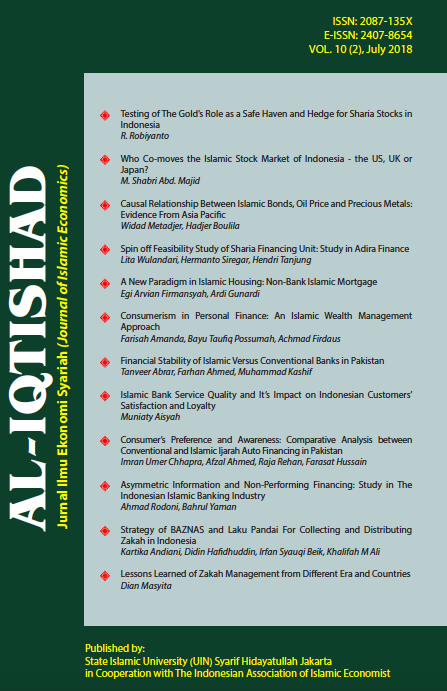Consumerism in Personal Finance: An Islamic Wealth Management Approach
DOI:
https://doi.org/10.15408/aiq.v10i2.5518Keywords:
consumeris, personal finance, financial planning, Islamic wealth managementAbstract
Consumerism phenomenon has been noticed from various points of view, such culture, psychology, and sociology but rarely linked to personal finance using Islamic wealth management approach. The aims of this study are to understand the causes and impacts of consumerism on personal finance and find the solution to this problem by using Islamic wealth management. By using thematic analysis this study reviewing consumerism from the perspective of personal finance in Islamic wealth management approach. This study found that the causes of consumerism involve both external and internal factors. The impacts of consumerism on personal finance are the debt trap, no productive and charity allocation. An exact number of maximum consumption cannot be set for every individual or family, but they are all agreed that allocating income should be based on the right priority scale. The second finding is we propose Islamic Wealth Management (IWM) approaches in reducing the problem of Consumerism.
References
Al-Asyaqar, S. (2006). Manajemen Harta (Wealth Management). Depok: Bina Mitra Press.
Aldridge, A. (1997). Engaging with Promotional Culture: Organised Consumerism and the Personal Financial Services Industry. Sociology. Vol. 31 (3): 389-408. doi: https://doi.org/10.1177/0038038597031003002.
Asy Sya’rawi, M. M. (1993). Rezeki (Ar Rizqu). Jakarta: Gema Insani Press.
Basri, I. A. (2007). Menguak Pemikiran Ekonomi Ulama Klasik (Revealing Economic Thought of Classical Scholars). Solo: Aqwam.
Basgöze, P., & Tektas, Ö. Ö. (2012). Ethical Perceptions and Green Buying Behavior of Consumers: A Cross-national Exploratory Study. Journal of Economics and Behavioral Studies. Vol. 4(8): 477–488.
Bauman, Z. (2005). Work, Consumerism and The New Poor: 2nd ed. England: Open University Press.
Braun, V., & Clarke, V. (2008). Using Thematic Analysis in Psychology. Qualitative Research in Psychology. Vol. 3(2): 77-101. doi: https://doi.org/10.1191/1478088706qp063oa.
Dowd, D. (2009). Inequality and The Global Economic Crisis. USA: Pluto Press.
Essoussi, L. H., & Linton, J. D. (2010). New or Recycled Products: How Much are Consumers willing to pay? Journal of Consumer Marketing. Vol. 27(5): 458–468. doi: http://doi.org/10.1108/07363761011063358
Fligstein, N., & Mc Adam, D. (2012). A Theory of Fields. New York: Oxford University Press.
Halina, S. B., & Philip J. Vergragt (2015). From Consumerism to Wellbeing: Toward a Cultural Transition? Journal of Cleaner Production. Vol. 132: 308-317.
Heryanto, J. (2004). Pergeseran Nilai dan Konsumerisme di Tengah Krisis Ekonomi di Indonesia (Shifting Values and Consumerism Amid The Economic Crisis in Indonesia). Nirmana. Vol. 6 (1): 52-62.
Indrajit, R. E., & Djokopranoto, R. (2011). Wealth Management untuk Penyelenggaraan Perguruan Tinggi (Wealth Management for University Management). Yogyakarta: CV Andi Offset.
Ismail, N. (2014). Maqashid Syariah dalam Ekonomi Islam (Maqashid Shariah in Islamic Economics. Yogyakarta: Smart WR.
Kahf, M. (1995), Ekonomi Islam: Telaah Analitik terhadap Fungsi dan Sistem Ekonomi Islam (Islamic Economics: Analytical Review of The Function and System of Islamic Economics). Yogyakarta: Pustaka Pelajar.
Kapoor, J. R., Dlabay, L. R., & Hughes, R. J. (2012). Personal Finance. Tenth Edition. New York: The McGraw-Hill Companies, Inc.
Kasser, T., & Kanner, A. D. (Eds). (2004). Psychology and Consumer Culture: The Struggle for a Good Life in a Materialistic World. Washington, DC: American Psychological Association.
Mannan, M. A. (1986). Islamic Economics; Theory and Practice (Foundation of Islamic Economics), England: Holder and Stoughton Ltd
Manurung, A. H. (2008). Wealth Management: Menuju Kebebasan Finansial (Wealth Management: To Financial Freedom). Jakarta: Kompas.
Mobley, A. S., Painter, T. S., Untch, E. M., & Unnava, H. R. (1995). Consumer Evaluation of Recycled Products. Psychology and Marketing. Vol. 12(3): 165-176.
O'Neill, B., Bristow, B., & Brennan, P. (2000). Changing Financial Behavior: Implications for Family and Consumer Sciences Professionals. Journal of Family and Consumer Sciences. Vol. 99(4): 43-48.
Possumah, B. T., Baharuddin, G., & Ismail, A. G. (2012). Religious Based Economy: Reflection on Economic Development Outcomes in Islam. Proceding Paper in International Conference on Social Sciences & Humanities (ICOSH), FSSK UKM, 12-13 Dec 2012 Malaysia.
Qardhawi, Y. (1997), Norma dan Etika Ekonomi Islam (Norms and Ethics in Islamic Economics). Jakarta: Gema Insani Press.
Shafii, Z., Zarinah, M. Y., & Shahizan, Md. N. (2013). Islamic Financial Planning and Wealth Management. Kuala Lumpur, Malaysia: IBFIM.
Solomon, M. R. (2013). Consumer Behavior: Buying, Having, and Being (Tenth Edition). Essex: Pearson Education Limited.
Stearns, P. N. (2001). Consumerism in World History: The Global Transformation of Desire. London: Routledge.
Swagler, R. (2005). Evolution and Applications of the Term Consumerism: Theme and Variations. Journal of Consumer Affairs. Vol. 28 (2): 347-360.
Syahatah, H. (1998). Ekonomi Rumah Tangga Muslim (The Economy of Muslim Household). Jakarta: Gema Insani Press.
Taylor, D. S., & Overbey, G. (1999). Financial Practices and Expectations of Student and Non-student Consumers. Journal of Family and Consumer Sciences. Vol. 91(4): 39-42.
Wrenn, B., Loudon, D., & Bitta, A. D. (2013). Consumer Behavior: Putting Theory into Practice (Fifth Edition). New Jersey: Textbook Media Press.

